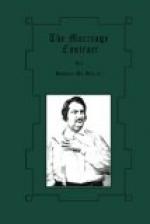Mother and daughter had a true friendship for each other, beyond the filial and maternal sentiment. They suited one another, and their perpetual contact had never produced the slightest jar. Consequently many persons explained Madame Evangelista’s actions by maternal love. But although Natalie consoled her mother’s persistent widowhood, she may not have been the only motive for it. Madame Evangelista had been, it was said, in love with a man who recovered his titles and property under the Restoration. This man, desirous of marrying her in 1814 had discreetly severed the connection in 1816. Madame Evangelista, to all appearance the best-hearted woman in the world, had, in the depths of her nature, a fearful quality, explainable only by Catherine de Medici’s device: “Odiate e aspettate”—“Hate and wait.” Accustomed to rule, having always been obeyed, she was like other royalties, amiable, gentle, easy and pleasant in ordinary life, but terrible, implacable, if the pride of the woman, the Spaniard, and the Casa-Reale was touched. She never forgave. This woman believed in the power of her hatred; she made an evil fate of it and bade it hover above her enemy. This fatal power she employed against the man who had jilted her. Events which seemed to prove the influence of her “jettatura”—the casting of an evil eye—confirmed her superstitious faith in herself. Though a minister and peer of France, this man began to ruin himself, and soon came to total ruin. His property, his personal and public honor were doomed to perish. At this crisis Madame Evangelista in her brilliant equipage passed her faithless lover walking on foot in the Champes Elysees, and crushed him with a look which flamed with triumph. This misadventure, which occupied her mind for two years, was the original cause of her not remarrying. Later, her pride had drawn comparisons between the suitors who presented themselves and the husband who had loved her so sincerely and so well.
She had thus reached, through mistaken calculations and disappointed hopes, that period of life when women have no other part to take in life than that of mother; a part which involves the sacrifice of themselves to their children, the placing of their interests outside of self upon another household,—the last refuge of human affections.
Madame Evangelista divined Paul’s nature intuitively, and hid her own from his perception. Paul was the very man she desired for a son-in-law, for the responsible editor of her future power. He belonged, through his mother, to the family of Maulincour, and the old Baronne de Maulincour, the friend of the Vidame de Pamiers, was then living in the centre of the faubourg Saint-Germain. The grandson of the baroness, Auguste de Maulincour, held a fine position in the army. Paul would therefore be an excellent introducer for the Evangelistas into Parisian society. The widow had known something of the Paris of the Empire, she now desired to shine in the Paris of the Restoration.




